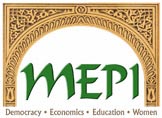

Partners
Middle East Partnership Initiative (MEPI)

Middle East Partnership Initiative- People in the broader Middle East seek greater freedom and opportunity, and a growing community of reformers in the region has emerged with new energy and ideas to make these aspirations a reality. The United States strongly supports the reformers who are working to build a more peaceful and prosperous Middle East. One tangible demonstration of support is President George W. Bush's Middle East Jordanian girl reading book from My Arabic Library [State Dept. Photo]Partnership Initiative, which has devoted more than $293 million in four years to reform efforts -- so democracy can spread, education can thrive, economies can grow, and women can be empowered. Middle East Partnership Initiative (MEPI) funding goes directly to partners such as non-governmental organizations, businesses, and universities. Since 2002, MEPI has set in motion more than 350 programs in 16 countries and the Palestinian territories through its offices in Washington, Tunis, and Abu Dhabi. MEPI investments are in addition to billions of dollars in bilateral assistance the U.S. provides annually to the Middle East.
Digital Freedom Initiative (DFI)

A public-private partnership with the US Department of State, US Agency for International Development, US Department of Commerce, Volunteers for Prosperity, Peace Corps, US Small Business Administration
The President's Digital Freedom Initiative (DFI) was launched on March 4, 2003 at the White House, where the Governments of Senegal and the United States agreed to pilot the DFI. Since 2003 the DFI has grown to encompass programs in many countries using ICTs to help spur economic growth and policy reform. The DFI approach leverages the leadership of the US government with both the creativity and resources of American business and the vision and energy of local partners throughout the developing world.
The Desmond Tutu HIV Foundation

The Desmond Tutu HIV Foundation provides holistic treatment programs using antiretroviral treatment, distributed with an emphasis on family care, through community sites and clinics. Sizophila ("We Will Survive") is a cornerstone program of DTHF, comprised of twenty-four lay counselors, whose job is to educate and support patients undergoing ARV treatment. Because they live with HIV themselves, the counselors are able to relate fully to the patients, and offer counseling in nutrition, ARV support, and sexual responsibility. Doris Duke Foundation has funded a pilot for a distance-learning tool to train lay health care workers throughout South Africa.
YouthAIDS

YouthAIDS is an education and prevention initiative of Population Services International that uses media, pop culture, music, theatre and sports to stop the spread of HIV/AIDS and to reach 600 million young people in more than 60 countries with live-saving messages, products, services and care. Since 1992, YouthAIDS/PSI has worked via its local affiliate in South Africa, the Society for Family Health, to generate awareness of HIV/AIDS among township populations. Program activities include: peer education programs in schools, clinics and community centers; street campaigns using an edutainment approach; and voluntary counseling and testing (VCT) services at three centers and via a mobile unit. Primary funders include U.S. Agency for International Development (USAID) and the U.S. Centers for Disease Control and Prevention (CDC). For more information on YouthAIDS, visit www.youthaids.org.
Plan

Plan strives to achieve lasting improvements in the quality of life of deprived children in developing countries through a process that unites people across cultures and adds meaning and value to their lives
FilmAid

FilmAid's mission is to use the power of film to promote health, strengthen communities, and enrich the lives of the world's vulnerable and uprooted.
Monwabisi: Home-based Care

The mission of Monwabisi is to deliver community-based primary healthcare and home-based care services to chronically and terminally ill people living with HIV/AIDS, and severe functional disabilities in the informal settlement of Imizamo Yethu, Hout Bay. Monwabisi looks after 110 people in a community of 16,000 peoplemost of whom live in abject poverty. One in every three pregnant women in Imizamo Yethu tests positive for the HIV virus and many sick and dying have no one to care for them or to help them secure basic foods to stay healthy. Without any budget since its inception in 2004, Monwabisi has brought affordable care to the people who need it most through a caring staff of volunteers.
Noah

Noah (Nurturing Orphans of AIDS for Humanity) was launched in 2000 by Dr. Greg Ash to confront the "epidemic of orphans" in the wake of the AIDS pandemic in South Africa. Its role is to build Arksor sustainable networks of careto improve the quality of life of orphans and vulnerable children (OVCs) and their families. Noah currently has 82 Arks in Gauteng and Kwa-Zulu Natal, with over 869 committee members, 1238 volunteers and more than 25,000 registered children. Noahs model of community-owned resource centers are designed to be cost-effective and spread throughout South Africa. Primary funders include PEP-FAR.
Africa Jam

Africa Jam is a nonprofit organization that provides youth with knowledge and life skills to develop their artistic talents. Africa Jam supports a variety of grassroots programs in townships to become fully youth-led initiatives through a two-week leadership training camp, on-going support, camps, school programs and holiday clubs. Starting in 2006, they have supported a drama program, Helping Hands, in the township of Khayelitsha, to create a safe space for teens to express and transform their challenges through drama, song, poetry and dance.






